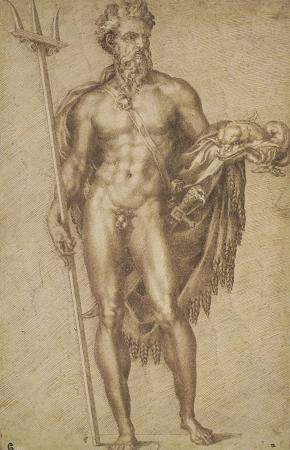Neptune / Poseidon. Neptune is the god of freshwater and the sea in Roman religion. He is the counterpart of the Greek god Poseidon. In the Greek-influenced tradition, Neptune is the brother of Jupiter and Pluto; the brothers preside over the realms of Heaven, the earthly world, and the Underworld. Salacia is his wife. Depictions of Neptune in Roman mosaics, especially those of North Africa, are influenced by Hellenistic conventions. Neptune was likely associated with fresh water springs before the sea. Like Poseidon, Neptune was worshipped by the Romans also as a god of horses, under the name Neptunus Equester, a patron of horse-racing. The etymology of Latin Neptunus is unclear and disputed. The ancient grammarian Varro derived the name from nuptus i.e. covering, with a more or less explicit allusion to the nuptiae, marriage of Heaven and Earth. By using the comparative approach the Indo-Iranian, Avestan and Irish figures would show common features with the Roman historicised legends about Neptune. A different etymology grounded in the legendary history of Latium and Etruria was proposed by the 19th-century scolars Ludwig Preller, Karl Otfried Müller and Wilhelm Deeke: the name of the Etruscan deity Nethuns or Nethunus would be an adjectival form of the toponym Nepe or Nepete, town of the ager Faliscus near Falerii. The district was traditionally connected to the cult of the god. Messapus and Halesus, the eponymous hero of Falerii, were believed to be his own sons. Messapus led the Falisci and others to war in the Aeneid. Nepi and Falerii have been famed since antiquity for the excellent quality of the water of their springs, scattered in meadows. Nepet, however, might be considered a hydronymic toponym of pre-Indo-European origin, from an appellative meaning damp wide valley, plain, cognate with pre-Greek νάπη, wooded vale, chasm. The theology of Neptune may only be reconstructed to some degree, as since very early times he was identified with the Greek god Poseidon: his presence in the lectisternium of 399 BC is a testimony to the fact. Such an identification may well be grounded in the strict relationship between the Latin and Greek theologies of the two deities. It has been argued that Indo-European people, having no direct knowledge of the sea as they originated from inland areas, reused the theology of a deity originally either chthonic or wielding power over inland freshwaters as the god of the sea. This feature has been preserved particularly well in the case of Neptune who was definitely a god of springs, lakes and rivers before becoming also a god of the sea, as is testified by the numerous findings of inscriptions mentioning him in the proximity of such locations. Servius the grammarian also explicitly states Neptune is in charge of all the rivers, springs and waters. He also is the lord of horses because he worked with Minerva to make the chariot.
more...














